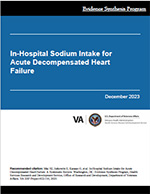
|
Recommended citation: |
Download PDF: Complete Report, Executive Summary, Report, Appendices
Five studies found no difference in intermediate, clinical, or health service use outcomes between patients on a low sodium compared to higher sodium diet. Fewer calories were consumed by patients on a low sodium diet. Fifteen studies found that sodium supplementation, mostly with intravenous hypertonic saline and furosemide, improved kidney function measures compared with diuretics alone, but not serum markers related to heart failure; some clinical outcomes and hospital length of stay were also improved.
Acute decompensated heart failure (ADHF) is a leading cause of hospitalization and rehospitalization in the United States. Standard inpatient management of ADHF has included restricting dietary sodium; however, there is no consensus in clinical guidelines on the threshold of sodium intake per day. In this review, we synthesize the evidence on the comparative effectiveness of oral and/or intravenous prescribed sodium intake interventions, both restriction and supplementation (with diuretics), in the treatment of hospitalized ADHF patients.
Four randomized controlled trials and 1 nonrandomized comparative study (N = 381 total) compared a lower sodium diet to higher sodium diets. Sodium restriction did not differentially affect most intermediate, clinical, or health service use outcomes, but with insufficient evidence for NT-proBNP, weight, and mortality outcomes. Patients consumed fewer calories on a restricted sodium diet compared to higher sodium diet. Thirteen randomized controlled trials and 2 nonrandomized comparative studies (N = 3,483 total) compared HSS or oral sodium chloride (in 1 study) with furosemide to furosemide alone. Sodium supplementation significantly decreased serum creatinine, brain natriuretic peptide, and weight, and increased kidney function, urine output, and serum sodium. There were no significant differences in NT-proBNP, serum aldosterone, plasma renin activity, or cystatin C. Sodium supplementation improved New York Heart Association functional class and thirst symptoms and reduced hospital length of stay. There was insufficient evidence on mortality and readmission outcomes.
In-Hospital Sodium Intake for Acute Decompensated Heart Failure (Management eBrief)